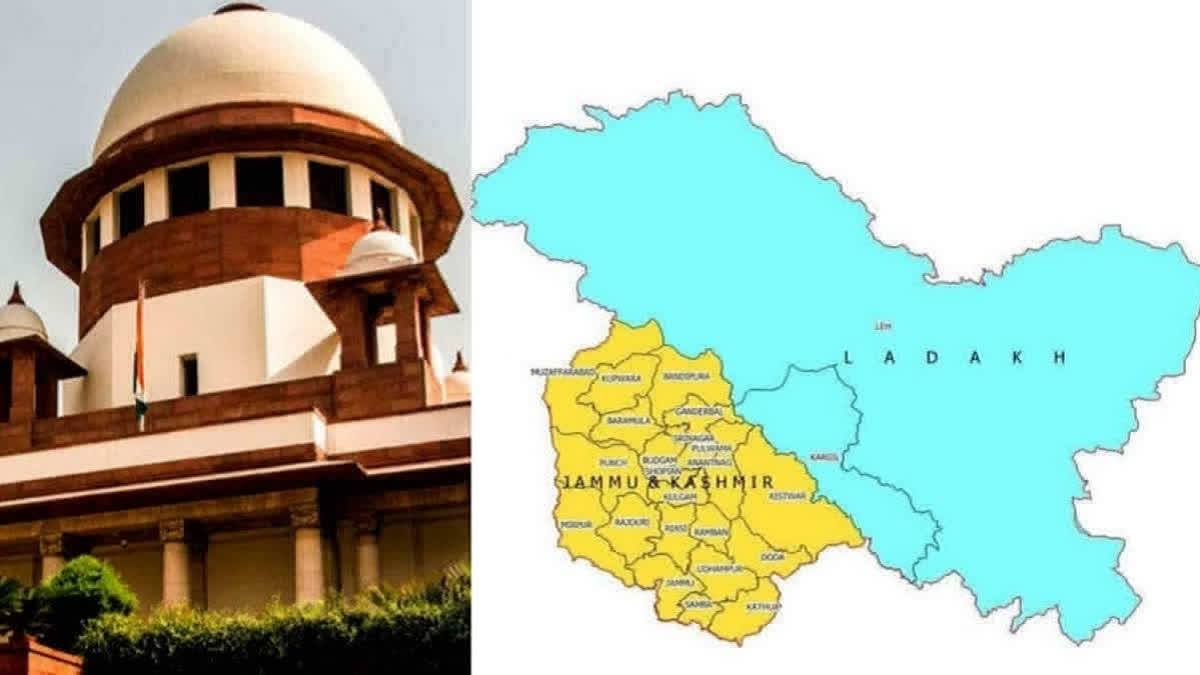New Delhi: The Supreme Court pronounced its verdict on Monday on a batch of petitions challenging the abrogation of the provisions of Article 370, which bestowed a special status on the erstwhile state of Jammu and Kashmir.
The Centre abrogated the provision of Article 370 of the Constitution on August 5, 2019 and downgraded the state into a Union Territory. According to the cause list for December 11 (Monday), uploaded on the apex court's website, a five-judge Constitution bench headed by Chief Justice D Y Chandrachud would deliver the verdict. The other members of the bench are Justices Sanjay Kishan Kaul, Sanjiv Khanna, B R Gavai and Surya Kant.
The apex court reserved its verdict in the matter on September 5 after a 16-day hearing. During the hearing, the top court heard Attorney General R Venkataramani, Solicitor General Tushar Mehta, senior advocates Harish Salve, Rakesh Dwivedi, V Giri and others on behalf of the Centre and the intervenors defending the abrogation of the provisions of Article 370.
Senior advocates, including Kapil Sibal, Gopal Subramanium, Rajeev Dhavan, Zaffar Shah and Dushyant Dave, had argued on behalf of the petitioners. The lawyers had dwelt on various issues, including the constitutional validity of the Centre's decision to abrogate the provisions of Article 370, the validity of the Jammu and Kashmir Reorganisation Act, which split the erstwhile state into two Union territories, challenges to the imposition of the governor's rule in Jammu and Kashmir on June 20, 2018 and the imposition of the president's rule on December 19, 2018 and its extension on July 3, 2019.
The petitions challenging the abrogation of the provisions of Article 370 and the validity of the Jammu and Kashmir Reorganisation Act, 2019 that divided the erstwhile state into the Union territories of Jammu and Kashmir and Ladakh were referred to the Constitution bench in 2019. The arguments in the matter had commenced on August 2.
During the hearing, the apex court had asked who can recommend the revocation of Article 370 in Jammu and Kashmir when no constituent Assembly, the concurrence of which is required before taking such a step, exists there. The top court had also asked how can a provision (Article 370), which was specifically mentioned as temporary in the Constitution, become permanent after the tenure of the Jammu and Kashmir constituent Assembly came to an end in 1957.
Some of the petitioners opposing the repeal of Article 370 had argued that the provision could not have been abrogated as the term of the Jammu and Kashmir constituent Assembly ended in 1957 after it drafted the erstwhile state's Constitution. With the constituent Assembly having become extinct, Article 370 acquired a permanent status, they had said. The Centre had argued that there was no "constitutional fraud" in annulling the provision that accorded the special status to the erstwhile state of Jammu and Kashmir.
Hope SC delivers verdict in favour of people of J&K: Ghulam Nabi Azad
Former Jammu and Kashmir chief minister Ghulam Nabi Azad expressed hope on Sunday that the Supreme Court will deliver a verdict in favour of the people on a bunch of petitions challenging the abrogation of the provisions of Article 370. "I have said it earlier ... there are only two (institutions) that can return articles 370 and 35A to the people of Jammu and Kashmir -- Parliament and the Supreme Court. The Supreme Court bench is non-partisan and we hope that it will give a decision in favour of the people of Jammu and Kashmir," Azad told reporters in Srinagar.
Azad, who floated the Democratic Progressive Azad Party (DPAP) after parting ways with the Congress, said he cannot foresee Parliament reversing the decisions taken on August 5, 2019 as it would require a two-thirds majority in the Lok Sabha. "To return Article 370 and Article 35A would require 350 seats (in the Lok Sabha). Any regional party in Jammu and Kashmir can get three, four or a maximum of five seats. That would not be enough. I do not see the opposition mustering such numbers. (Prime Minister Narendra) Modiji had the majority, but he did not do it. So it is only the Supreme Court that can do it," he said.
Azad said the people of Jammu and Kashmir, irrespective of their religion or ethnicity, have an emotional attachment with the special provisions of the Constitution that were repealed four years ago. "The people of Jammu and Kashmir are attached to Article 370 and Article 35A, not politically but emotionally. It is important that these (provisions) are restored for securing our present and future," he said. (With Agency inputs)
Also read:
- Article 370 verdict on Dec 11: Omar, Mehbooba express apprehensions; security beefed up in J&K
- 'Ek nishan, ek Pradhan, ek Samvidhan...' Amit Shah tells Lok Sabha during J&K reorganisation, amendment bills debate
- Omar Abdullah vows to continue 'political fight' against revocation of Article 370 from J-K regardless of SC verdict



